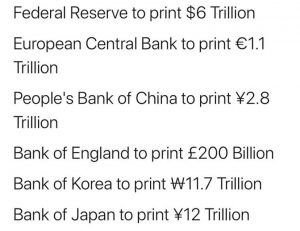The Coronavirus has infected our economy, and the financial markets are currently experiencing the symptoms. Not only are stock markets in a free fall, but real estate and bond markets are suffering as well. While all of this is happening, central banks are printing money like crazy in an attempt try to stop the harm.

With these amounts of money being produced out of thin air through the fiat currency system, inflation is sure to be a result, which is going to result in further consequences for all assets denominated in that currency. The future is filled with uncertainty, and unless we change the way we manage our money, our portfolios might be wiped out. The investment strategies that work in a bull market will not work in a bear market, and to come out on top, it is essential to adapt our financial strategies.
Stock markets can continue to crash, and along with that, mutual funds, stock market ETFs, robo-advisors, will suffer equally large losses.Banks can go out of business as their outstanding loans can’t be paid back, which will not only affect the bond markets but also bank accounts. Housing prices can fall to a point where owners might have to go through a foreclosure. No matter what happens, a financial crisis does not have to be a time of despair, if the right strategies are applied.
In this article, we will break down the main ways to protect wealth during a financial crisis and use it as an opportunity. We will go over the optimal alternatives for you to protect and grow your portfolio, from the safest strategies suitable for everyone, to the riskiest strategies, only suitable for experienced investors.
1. Structured investments

By investing in structured products like permanent life insurance or annuities, an investor can limit their risks, while getting minimum guaranteed returns of 4-5 %, even during a market crash. This is an effective way of managing investment risk as these products have a track record of stable performance through many market crashes. In fact, if we look at previous crises, returns are rarely affected more than half a percent. Additionally, they provide tax benefits, as permanent life insurance being tax free throughout a lifetime and annuities being tax free until retirement. However, getting started with structured investments usually requires physical meetings, which is hard during COVID-19 times. A better alternative than traditional advisors is then to buy permanent life insurance through an online broker, which can make it quicker, cheaper and more efficient for you to get started.
For permanent life insurance, White Swan is soon to introduce the first ever digital platform for investing in these products online, in the comfort of your own home. For annuities, Blueprint Income offers a neat platform for investing in fixed and immediate annuities. The advantages of investing in structured investments is that investment risk is limited by design, which transfers the risk of losses to big and prudent financial institutions. Because of these reasons, structured investments is an excellent base layer to act as a cushion for potential losses elsewhere.
2. Gold

Some assets can have a negative correlation to stock markets, and actually increase in prices during times of uncertainty. One of these is gold, which is known to be bought by investors as a safe haven asset, which increased in price by 3x between 2006 and 2012. Gold can be bought in different ways, either through investing directly in physical gold such as coins, or through paper assets like ETFs. It is important to understand that the risk is higher when owning gold through a paper asset, as the institution which created that asset could go out of business.
By owning gold directly, this risk is eliminated, and by using providers like Golden Suisse, the holdings can grow tax free and be accessed via debit card. While these investments have the potential to decline in valuation, they can be a good alternative to cash, as they are more liquid than structured investments.
3. Cryptocurrencies

Another alternative are cryptocurrencies like bitcoin, as these currencies do not face the same inflation risk as normal currencies. The reason for this is that the amount of currency units in circulation can by design never grow beyond a certain amount. As an example, the amount of Bitcoins in the world will never be more than 21 million.
Additionally, the amount of new Bitcoins being continuously created are steadily decreasing, and by 2033 all Bitcoins that ever will exist will be created, and no new Bitcoins will appear. This means that these currencies can not be victims of central banks printing money and increasing inflation, as they have different mechanisms for creating new money. For this reason, cryptocurrencies like Bitcoin, Litecoin, and Ethereum can be a good way of diversifying your cash and decreasing inflationary risks. These can be easily bought online through providers like Coinbase. However, cryptocurrencies are volatile assets, and should only make up a minority of your portfolio.
4. Options

Options are financial contracts that are tied to underlying assets like stocks, commodities, or currencies. They can rise or fall in price due to the change in price of the underlying, or through the change of implied volatility, which is the most important pricing factor that distinguishes options from other assets. Going into a market crash, owning a put option on a market index is an easy way to make quick profit on the rapid movements, as the contract will increase in price both from the decline in price and the increase in volatility.
However, once in a market crash, buying options is no longer a good alternative, as prices to buy will be high due to an increased implied volatility. Thus, during a market crash, selling a put option on high quality stocks (like AAPL, AMZN, or NFLX) can be a good way of making extra investment income and buying high quality assets at heavy discounts. The reason for this is that because the implied volatility is high, the options are gonna be sold at an expensive premium, and if they were to get triggered, the investor will still buy a high quality stock at a good price.
A good place to trade options without commissions is Robin Hood, or by using a platform with solid analytical tools like Thinkorswim. However, options are complex contracts, and should only be handled by experienced and knowledgeable investors, as they can impose unexpected risks.
5. Futures

Futures are just like options financial contracts that are tied to underlying assets, however, they are not only affected by price movements, and not implied volatility. These contracts provide a way to take leveraged positions both on upwards and downwards movements of prices, and can be a good way to make money from declining prices, if handled correctly. Countries like France, Italy, and Spain have already banned the practice of shorting their indexes, but many indexes are still available to short.
However, active risk management when trading these contracts are essential. An effective strategy can be to trade breakouts through limit entry orders and then continually lock in profits and protect downside risk through trailing stop losses. In this way, investors will only short once the price is in a free fall, and will never have to see a profit turn into a loss. To trade these contracts, a good alternative good be a provider like IG. However, futures are risky contracts, and should be handled actively by experienced and knowledgeable investors.
In conclusion
A financial crisis carries a lot of risks, but can also bring opportunity if investors adapt their financial strategies in the right way. By investing in structured investments like permanent life insurance or annuities, investors can limit their downside risks and get guaranteed returns without taxes. By investing in gold, investors can profit from the safe haven status that increased the value of this precious metal by 3x during the last recession. By investing in cryptocurrencies, investors can diversify their cash and lower the risk of inflation tied to normal currencies. By trading options, traders can buy high quality stocks at a discount and make good money while doing it. By trading futures, traders can profit from rapid negative price movements.


